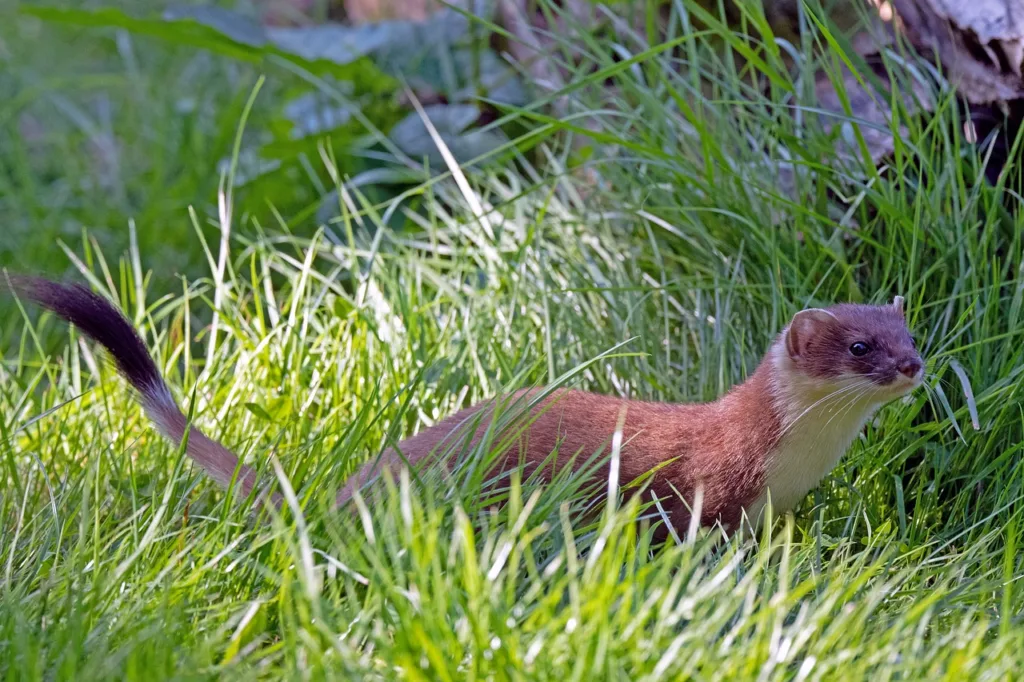Stoats are small, ferret-like mammals that are native to various regions around the world, including North America, Europe, and Asia. Lately, there has been a growing trend of people keeping stoats as pets, despite the fact that they are wild animals and not domesticated. However, keeping stoats as pets is not only illegal in most states of the U.S but also highly inadvisable. In this article, we will explore the reasons why stoats should not be kept as pets.
Stoats require a specific diet and living conditions that are often difficult to provide in a domestic setting. They are carnivorous animals that require a diet that consists mainly of meat, such as rodents, birds, and insects. Providing a balanced diet for a stoat can be challenging, as they require a high protein and fat diet to remain healthy. Additionally, stoats are active animals and require plenty of space to move around. They are not suitable for living in cages, as they need room to run and play.
Stoats are not bred in captivity, and any stoats that are available for sale are likely to have been captured from the wild. This means that they may be infected with diseases or parasites that could be harmful to humans. Moreover, wild-caught stoats are often stressed and traumatized by the experience, which can lead to aggressive behavior and make them difficult to handle.
Stoats are not docile animals and can be highly aggressive when they feel threatened or cornered. They are ferocious predators that are known to attack animals much larger than themselves, including rabbits, hares, and even small deer. Stoats have sharp teeth and claws, and their bites can cause serius injury or infection. They are also known to secrete a strong, musky odor when they feel threatened, which can be unpleasant for humans.
Unlike domesticated animals such as cats and dogs, stoats are not suitable for cuddling or domestication. They are wild animals that have not been bred for docility or human companionship. Stoats are independent creatures that prefer to live on their own and do not form strong bonds with humans.
Keeping stoats as pets is not only illegal but also highly inadvisable. Stoats are wild animals that require specific living conditions and a specialized diet. They are not domesticated and can be highly aggressive when threatened. Moreover, they are not suitable for cuddling or human companionship. If you are interested in owning a pet, there are many domesticated animals that make great companions and are much better suited for life in a domestic setting.
Do Stoats Make Good Pets?
Stoats do not make good pets. It is illegal to keep them as pets in most of the U.S. due to the fact that they are difficult to care for and not bred in captivity. Stoats are wild animals and their natural behaviors and needs cannot be met in a domestic setting. They require a specialized diet and environment, and can be unpredictable and aggressive towards humans. It is important to note that any stoats available for sale are likely wild-caught, whch can contribute to the decline of their populations in the wild. Therefore, it is recommended to leave stoats in their natural habitat and appreciate them from a distance.

Can You Domesticate A Stoat?
Stoats are not typically domesticated animals. They are wild creatures that have never been kept as pets until recently. While there are a few videos on the internet of people keeping stoats as pets, it is not recommended. Stoats are extremely independent and do not have the temperament or behavior of domesticated animals. They are not suited for living in a domestic environment and can pose a risk to people and oher animals around them. It is important to remember that while some wild animals may appear cute and cuddly, they are still wild animals and should be respected as such.
Are Stoats Aggressive?
Stoats are indeed aggressive predators that pose a significant threat to the environments they invade. They are kown for their voracious appetites and will prey on a wide variety of animals, including birds, rodents, and even rabbits that are several times their size. Stoats are also known to be highly territorial and will fiercely defend their territory against other animals, including humans.
When stoats invade a new environment, they can have a devastating impact on the local ecosystem. They can quickly decimate populations of native species, upset the balance of the food chain, and even cause the extinction of certain species. Additionally, stoats are known to be carriers of diseases that can be transmitted to other animals, including humans.
Stoats are indeed aggressive predators that can cause significant damage when they invade new environments. Their voracious appetites, territorial behavior, and potential to spread disease make them a formidable threat to local ecosystems.
Do Stoats Smell?
Stoats do have a distinct smell. When the stoat feels threatened or is being aggressive, it secretes the contents of its anal glands. This secretion gives rise to a strong, musky odor that is produced by several sulphuric compounds. This smell is different from the odor produced by least weasels. However, it is important to note that not all stoats smell all the time. The secretion of the anal glands is a defense mechanism that is used when the animal feels threatened or is in danger.
Conclusion
Stoats should not be kept as pets. It is illegal in most of the U.S. to own them due to the difficulties in caring for them and the fact that they are not bred in captivity. Any stoats that are available for sale are likely wild-caught, which is detrimental to wild populations. Furthermore, stoats are not domesticated and are extremely independent, making them unsuitable for cuddling or companionship. Additionally, stoats are aggressive predators that can cause serious damage to new environments they invade, making them potentially dangerous pets. it is best to appreiate stoats from afar in their natural habitats rather than attempting to keep them as pets.
